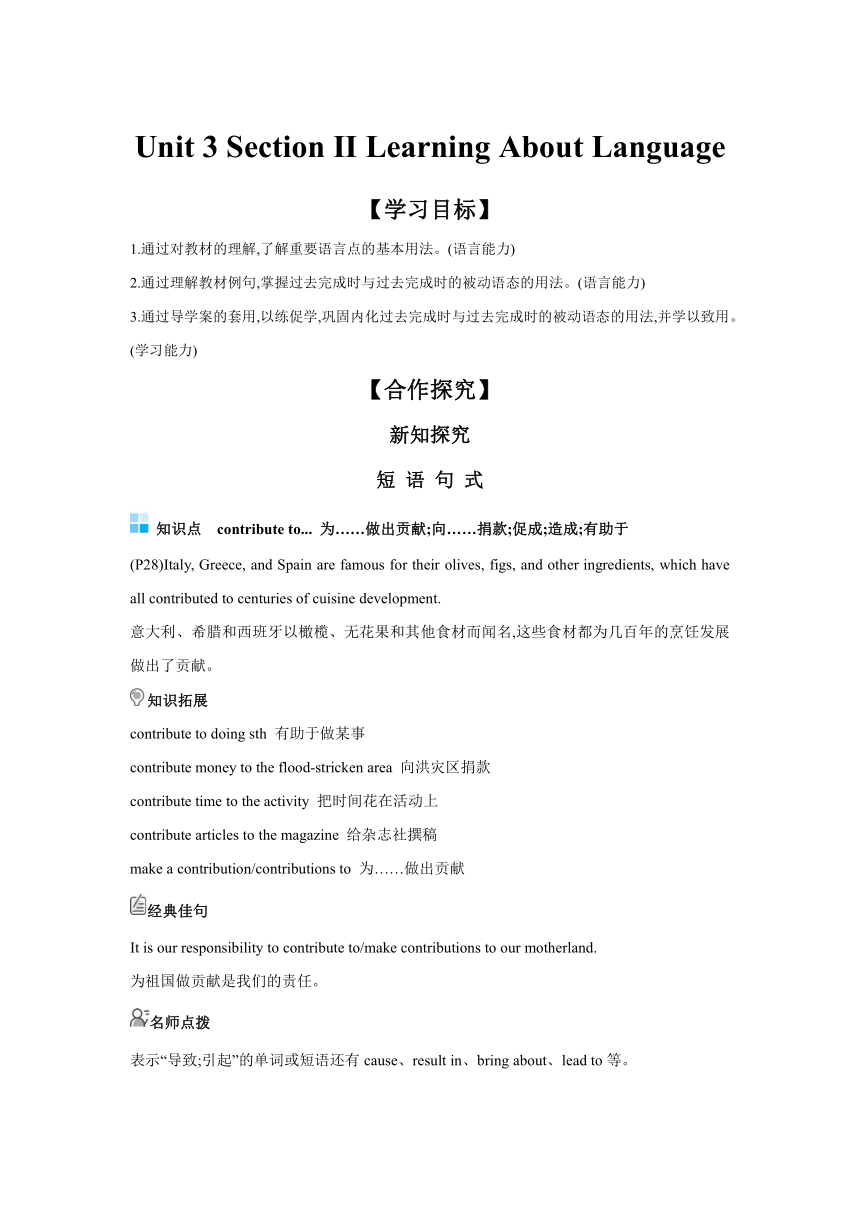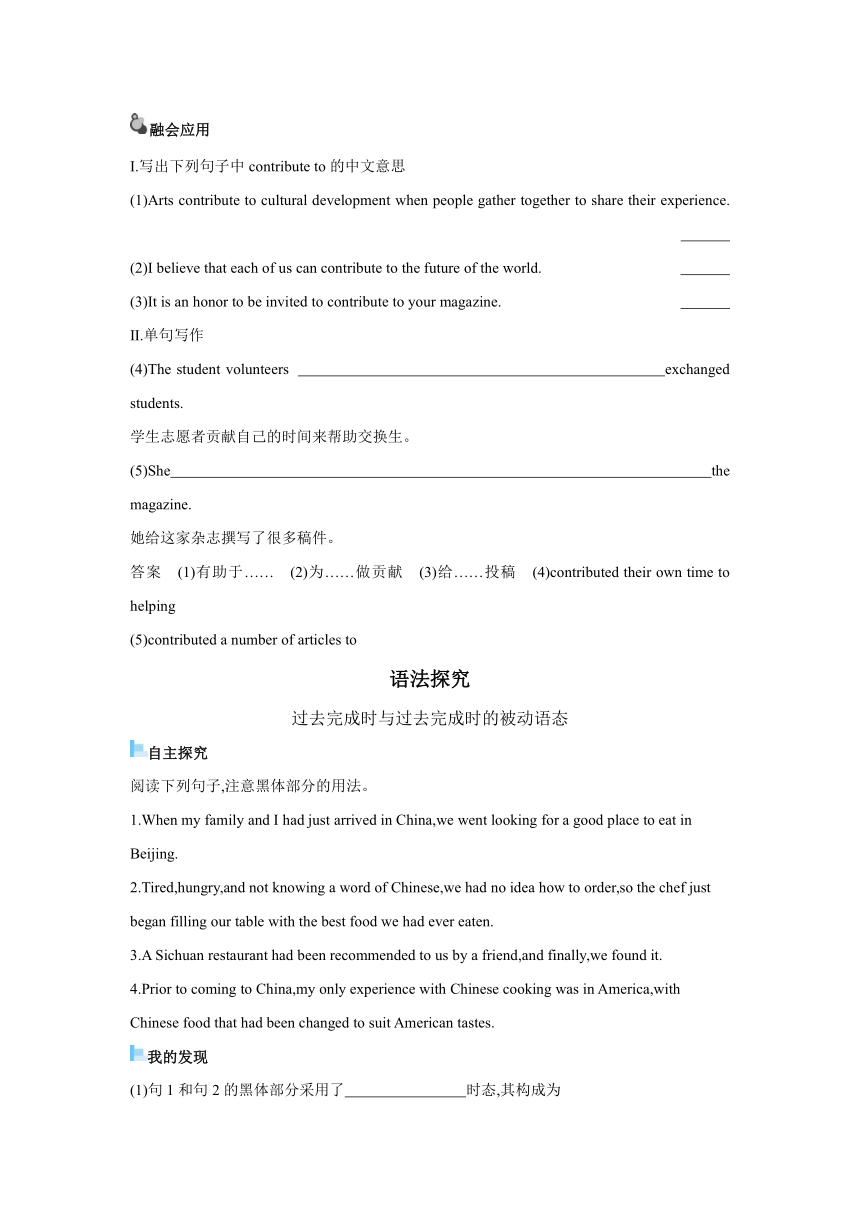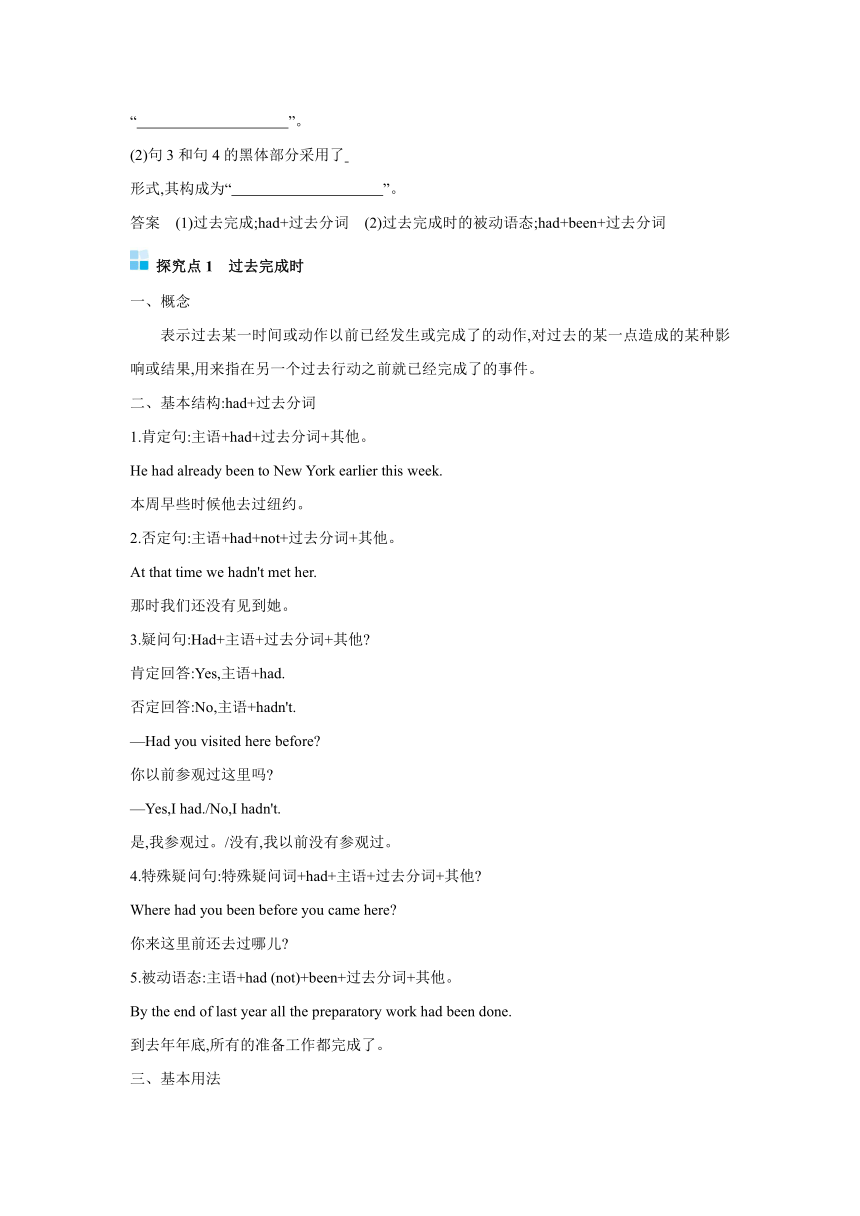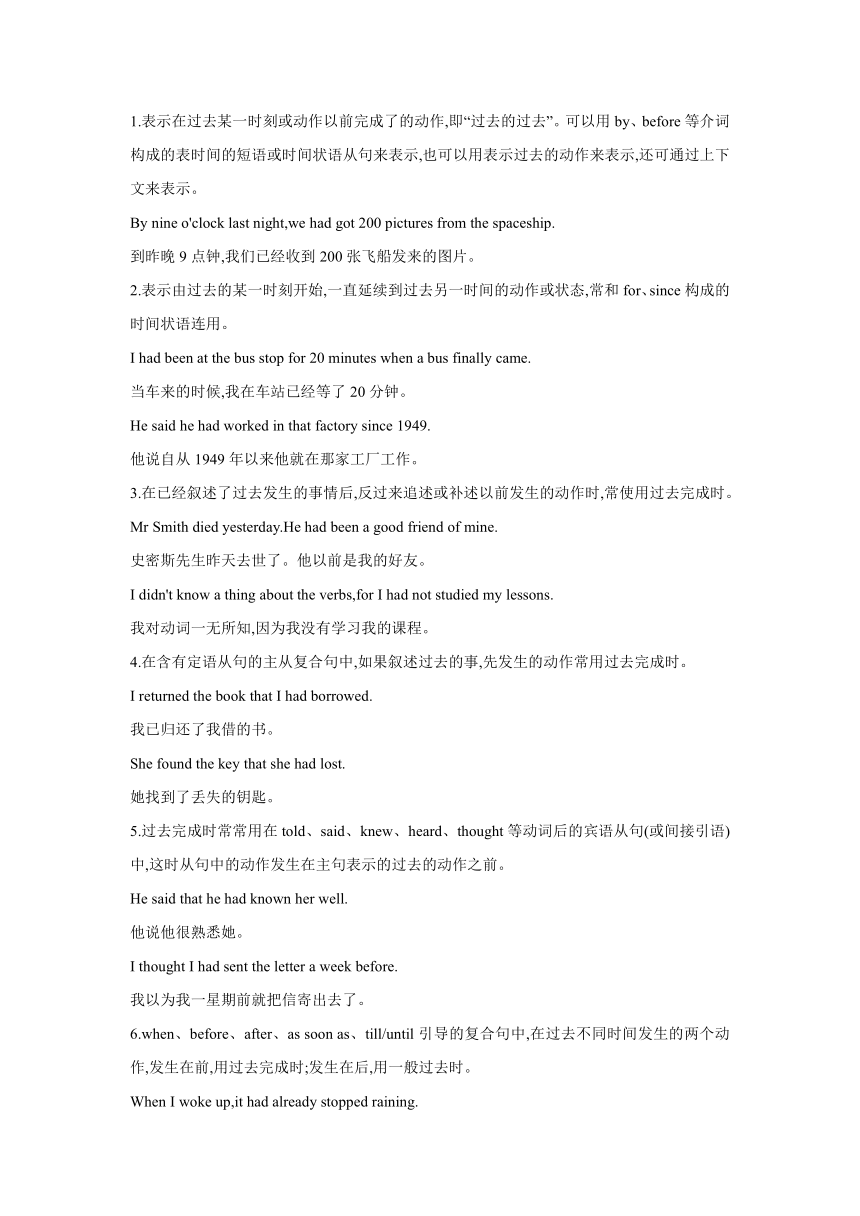人教版(2019)选择性必修 第二册Unit 3 Food and Culture Learning About Language 学案 (含答案)
文档属性
| 名称 | 人教版(2019)选择性必修 第二册Unit 3 Food and Culture Learning About Language 学案 (含答案) |  | |
| 格式 | docx | ||
| 文件大小 | 44.1KB | ||
| 资源类型 | 教案 | ||
| 版本资源 | 人教版(2019) | ||
| 科目 | 英语 | ||
| 更新时间 | 2024-04-07 17:18:40 | ||
图片预览




文档简介
Unit 3 Section Ⅱ Learning About Language
【学习目标】
1.通过对教材的理解,了解重要语言点的基本用法。(语言能力)
2.通过理解教材例句,掌握过去完成时与过去完成时的被动语态的用法。(语言能力)
3.通过导学案的套用,以练促学,巩固内化过去完成时与过去完成时的被动语态的用法,并学以致用。(学习能力)
【合作探究】
新知探究
短 语 句 式
知识点 contribute to... 为……做出贡献;向……捐款;促成;造成;有助于
(P28)Italy, Greece, and Spain are famous for their olives, figs, and other ingredients, which have all contributed to centuries of cuisine development.
意大利、希腊和西班牙以橄榄、无花果和其他食材而闻名,这些食材都为几百年的烹饪发展做出了贡献。
知识拓展
contribute to doing sth 有助于做某事
contribute money to the flood-stricken area 向洪灾区捐款
contribute time to the activity 把时间花在活动上
contribute articles to the magazine 给杂志社撰稿
make a contribution/contributions to 为……做出贡献
经典佳句
It is our responsibility to contribute to/make contributions to our motherland.
为祖国做贡献是我们的责任。
名师点拨
表示“导致;引起”的单词或短语还有cause、result in、bring about、lead to等。
融会应用
Ⅰ.写出下列句子中contribute to的中文意思
(1)Arts contribute to cultural development when people gather together to share their experience.
(2)I believe that each of us can contribute to the future of the world.
(3)It is an honor to be invited to contribute to your magazine.
Ⅱ.单句写作
(4)The student volunteers exchanged students.
学生志愿者贡献自己的时间来帮助交换生。
(5)She the magazine.
她给这家杂志撰写了很多稿件。
答案 (1)有助于…… (2)为……做贡献 (3)给……投稿 (4)contributed their own time to helping
(5)contributed a number of articles to
语法探究
过去完成时与过去完成时的被动语态
自主探究
阅读下列句子,注意黑体部分的用法。
1.When my family and I had just arrived in China,we went looking for a good place to eat in Beijing.
2.Tired,hungry,and not knowing a word of Chinese,we had no idea how to order,so the chef just began filling our table with the best food we had ever eaten.
3.A Sichuan restaurant had been recommended to us by a friend,and finally,we found it.
4.Prior to coming to China,my only experience with Chinese cooking was in America,with Chinese food that had been changed to suit American tastes.
我的发现
(1)句1和句2的黑体部分采用了 时态,其构成为“ ”。
(2)句3和句4的黑体部分采用了
形式,其构成为“ ”。
答案 (1)过去完成;had+过去分词 (2)过去完成时的被动语态;had+been+过去分词
探究点1 过去完成时
一、概念
表示过去某一时间或动作以前已经发生或完成了的动作,对过去的某一点造成的某种影响或结果,用来指在另一个过去行动之前就已经完成了的事件。
二、基本结构:had+过去分词
1.肯定句:主语+had+过去分词+其他。
He had already been to New York earlier this week.
本周早些时候他去过纽约。
2.否定句:主语+had+not+过去分词+其他。
At that time we hadn't met her.
那时我们还没有见到她。
3.疑问句:Had+主语+过去分词+其他
肯定回答:Yes,主语+had.
否定回答:No,主语+hadn't.
—Had you visited here before
你以前参观过这里吗
—Yes,I had./No,I hadn't.
是,我参观过。/没有,我以前没有参观过。
4.特殊疑问句:特殊疑问词+had+主语+过去分词+其他
Where had you been before you came here
你来这里前还去过哪儿
5.被动语态:主语+had (not)+been+过去分词+其他。
By the end of last year all the preparatory work had been done.
到去年年底,所有的准备工作都完成了。
三、基本用法
1.表示在过去某一时刻或动作以前完成了的动作,即“过去的过去”。可以用by、before等介词构成的表时间的短语或时间状语从句来表示,也可以用表示过去的动作来表示,还可通过上下文来表示。
By nine o'clock last night,we had got 200 pictures from the spaceship.
到昨晚9点钟,我们已经收到200张飞船发来的图片。
2.表示由过去的某一时刻开始,一直延续到过去另一时间的动作或状态,常和for、since构成的时间状语连用。
I had been at the bus stop for 20 minutes when a bus finally came.
当车来的时候,我在车站已经等了20分钟。
He said he had worked in that factory since 1949.
他说自从1949年以来他就在那家工厂工作。
3.在已经叙述了过去发生的事情后,反过来追述或补述以前发生的动作时,常使用过去完成时。
Mr Smith died yesterday.He had been a good friend of mine.
史密斯先生昨天去世了。他以前是我的好友。
I didn't know a thing about the verbs,for I had not studied my lessons.
我对动词一无所知,因为我没有学习我的课程。
4.在含有定语从句的主从复合句中,如果叙述过去的事,先发生的动作常用过去完成时。
I returned the book that I had borrowed.
我已归还了我借的书。
She found the key that she had lost.
她找到了丢失的钥匙。
5.过去完成时常常用在told、said、knew、heard、thought等动词后的宾语从句(或间接引语)中,这时从句中的动作发生在主句表示的过去的动作之前。
He said that he had known her well.
他说他很熟悉她。
I thought I had sent the letter a week before.
我以为我一星期前就把信寄出去了。
6.when、before、after、as soon as、till/until引导的复合句中,在过去不同时间发生的两个动作,发生在前,用过去完成时;发生在后,用一般过去时。
When I woke up,it had already stopped raining.
我醒来时,雨已经停了。
She didn't go to bed until she had finished her work.
直到把工作做完之后她才睡觉。
名师点拨
如果两个动作紧接着发生,则常常不用过去完成时,特别是在包含before和after的复合句中,因为从句的动作和主句的动作发生的先后顺序已经非常明确,可以用一般过去时代替过去完成时。
After he arrived in England,Marx worked hard to improve his English.
马克思到达英格兰之后,他努力提高他的英语水平。
7.动词think、want、hope、mean、plan、intend等用过去完成时来表示过去未曾实现的想法、希望、打算或意图等。
They had wanted to help but could not get there in time.
他们本来打算去帮忙,但没有及时赶到那里。
We had hoped to be able to come and see you.
我们本来希望能来看看你。
8.过去完成时还可用在hardly...when...,no sooner...than ...,it was the first (second,etc) time (that)...等固定句型中。
Hardly had he begun to speak when the audience interrupted him.
他刚开始演讲,听众就打断了他。
No sooner had he arrived than he went away again.
他刚到就又走了。
It was the third time that he had been out of work that year.
这是他那一年第三次失业了。
融会应用
单句填空
(1)I (intend) to call on you but I was too busy then.
(2)It was the first time that they (enjoy) such a wonderful performance.
(3)We hurried to the station only to find that the train (leave).
(4)No sooner (have) the boy spoken these words than the warden hit him on the head with the soup spoon.
(5)Silk (become) one of the primary goods traded along the Silk Road by about 100 BCE.
(6)When walking down the street,I came across David,whom I (not see) for years.
答案 (1)had intended (2)had enjoyed (3)had left (4)had (5)had become (6)hadn't seen
探究点2 过去完成时的被动语态
一、概念
过去完成时的被动语态表示动作在过去某一时刻或某个动作以前已经发生或已经完成,且主语与谓语动词为动宾关系。
二、基本结构
1.肯定结构:had been done
2.否定结构:had not been done
3.疑问句结构:
Had+...+been done...
特殊疑问词+had+...+been done...
三、基本用法
1.在tell、say、know、hear、think、find等动词用于一般过去时中,且其后接宾语从句时,宾语从句中的动作表被动且已完成时,要用过去完成时的被动语态。
He heard that the tickets had already been sold out.
他听说票已售罄。
The newspaper reported more than 100 people had been killed in the hurricane.
报纸报道说有一百多人在飓风中丧生。
2.当before、 when、by the time、 until、 after、 once等引导的时间状语从句为一般过去时,以及by、before后面接过去的时间,主句动作发生在从句的动作或过去的时间点之前且表示被动时,要用过去完成时的被动语态。
By the time she was 13, my sister had been sent to America.
我姐姐13岁前就已经被送到美国了。
200 cars had been produced by the end of last year.
到去年年底,200辆汽车已经生产出来了。
3.在It was the first/second ... time that ...句式中的that从句中,主语与谓语构成动宾关系时,从句中的谓语动词要用过去完成时的被动语态。
It was the first time that the meeting had been held in Zhengzhou.
这是该会议第一次在郑州召开。
4.在虚拟语气中,条件句表示与过去事实相反,且主语与谓语构成动宾关系时,从句中的谓语动词要用过去完成时的被动语态。
If I had been invited earlier, I would have gone there.
如果早点儿邀请我的话,我就去那儿了。
融会应用
Ⅰ.单句填空
(1)It was the first time that we (introduce) at the conference.
(2)It was the best film that (direct) by him.
(3)A week passed when she realised that the parcel (send) to the wrong address.
Ⅱ.句型转换
(4)They had cleaned the classroom before the teacher came.
→ .(变为被动语态)
答案 (1)had been introduced (2)had been directed
(3)had been sent (4)The classroom had been cleaned before the teacher came
【随堂检测】
【夯实基础】
Ⅰ.单句填空
1.I surfed the net and (see) an online advertisement,so I sent an email,saying that I wanted the job.
2.The universities in Britain (take) in many students from China and other Asian countries over the past few years.
3.The interviewer was interested in the grades I (get) in the exams.
4.By the time we got a report,the firemen (put) out the fire in the bar already.
5.We'll have to wait in line.The fast-food restaurant (be) short-handed for weeks.
6.She (want) to help you but she had no time then.
7.It was the first time I (be) in a foreign country.
8.The wallet (wrap) up in a newspaper and it contained half the money he had lost.
答案 1.saw 2.have taken 3.had got 4.had put
5.has been 6.had wanted 7.had been 8.had been wrapped
Ⅱ.语法填空
A cow and a fox went out to search for food together. They 1. (go) only a few miles before they saw a lion coming their way. They were both very frightened. The fox 2. (think) of a way of saving his own life, and went up to the lion and said in his ear,“I 3. (help) you get hold of the cow without the trouble of hunting him, if you let me go free.” The lion 4. (agree), and the fox then led the cow to a hidden pit(坑), which a hunter 5. (dig) as a trap for wild animals,and the cow 6. (fall) into it. When the lion saw that the cow 7. (catch) and couldn't get away, he 8. (turn) his attention to the fox. He soon finished him off, and then 9. (go) on to eat the cow.
Betray (背叛) a friend, and you'll often find you 10. (destroy) yourself.
答案 1.had gone 2.thought 3.will help 4.agreed
5.had dug 6.fell 7.had been caught 8.turned 9.went 10.have destroyed
Ⅲ.主题交际
根据提示完成下面对话。
Waitress:May I take your order now, sir
Customer:Yes, please.
Waitress:1. (你想要点什么)
Customer:I think I will have some fish.
Waitress:How would you like your fish prepared Smoked, fried or boiled
Customer:2. (我不喜欢水煮鱼).I like it fried.
Waitress:OK.What would you prefer to go with the fish, bread or pizza
Customer:I'd like bread.
Waitress:All right.What would you like to drink, water or juice
Customer:3. (果汁对我来说太甜了).I think a glass of water will be OK.
Waitress:Well, do you want to order anything else
Customer:4. (不用了,谢谢).
Waitress:OK.Let me repeat your order.You ordered fried fish with bread and a glass of water.5. (你还需要来点米饭吗)
Customer:No, thank you very much.
答案 1.What would you like to order 2.I don't like boiled fish 3.Juice is too sweet for me 4.No, thank you 5.Would you like to have some rice
【学习目标】
1.通过对教材的理解,了解重要语言点的基本用法。(语言能力)
2.通过理解教材例句,掌握过去完成时与过去完成时的被动语态的用法。(语言能力)
3.通过导学案的套用,以练促学,巩固内化过去完成时与过去完成时的被动语态的用法,并学以致用。(学习能力)
【合作探究】
新知探究
短 语 句 式
知识点 contribute to... 为……做出贡献;向……捐款;促成;造成;有助于
(P28)Italy, Greece, and Spain are famous for their olives, figs, and other ingredients, which have all contributed to centuries of cuisine development.
意大利、希腊和西班牙以橄榄、无花果和其他食材而闻名,这些食材都为几百年的烹饪发展做出了贡献。
知识拓展
contribute to doing sth 有助于做某事
contribute money to the flood-stricken area 向洪灾区捐款
contribute time to the activity 把时间花在活动上
contribute articles to the magazine 给杂志社撰稿
make a contribution/contributions to 为……做出贡献
经典佳句
It is our responsibility to contribute to/make contributions to our motherland.
为祖国做贡献是我们的责任。
名师点拨
表示“导致;引起”的单词或短语还有cause、result in、bring about、lead to等。
融会应用
Ⅰ.写出下列句子中contribute to的中文意思
(1)Arts contribute to cultural development when people gather together to share their experience.
(2)I believe that each of us can contribute to the future of the world.
(3)It is an honor to be invited to contribute to your magazine.
Ⅱ.单句写作
(4)The student volunteers exchanged students.
学生志愿者贡献自己的时间来帮助交换生。
(5)She the magazine.
她给这家杂志撰写了很多稿件。
答案 (1)有助于…… (2)为……做贡献 (3)给……投稿 (4)contributed their own time to helping
(5)contributed a number of articles to
语法探究
过去完成时与过去完成时的被动语态
自主探究
阅读下列句子,注意黑体部分的用法。
1.When my family and I had just arrived in China,we went looking for a good place to eat in Beijing.
2.Tired,hungry,and not knowing a word of Chinese,we had no idea how to order,so the chef just began filling our table with the best food we had ever eaten.
3.A Sichuan restaurant had been recommended to us by a friend,and finally,we found it.
4.Prior to coming to China,my only experience with Chinese cooking was in America,with Chinese food that had been changed to suit American tastes.
我的发现
(1)句1和句2的黑体部分采用了 时态,其构成为“ ”。
(2)句3和句4的黑体部分采用了
形式,其构成为“ ”。
答案 (1)过去完成;had+过去分词 (2)过去完成时的被动语态;had+been+过去分词
探究点1 过去完成时
一、概念
表示过去某一时间或动作以前已经发生或完成了的动作,对过去的某一点造成的某种影响或结果,用来指在另一个过去行动之前就已经完成了的事件。
二、基本结构:had+过去分词
1.肯定句:主语+had+过去分词+其他。
He had already been to New York earlier this week.
本周早些时候他去过纽约。
2.否定句:主语+had+not+过去分词+其他。
At that time we hadn't met her.
那时我们还没有见到她。
3.疑问句:Had+主语+过去分词+其他
肯定回答:Yes,主语+had.
否定回答:No,主语+hadn't.
—Had you visited here before
你以前参观过这里吗
—Yes,I had./No,I hadn't.
是,我参观过。/没有,我以前没有参观过。
4.特殊疑问句:特殊疑问词+had+主语+过去分词+其他
Where had you been before you came here
你来这里前还去过哪儿
5.被动语态:主语+had (not)+been+过去分词+其他。
By the end of last year all the preparatory work had been done.
到去年年底,所有的准备工作都完成了。
三、基本用法
1.表示在过去某一时刻或动作以前完成了的动作,即“过去的过去”。可以用by、before等介词构成的表时间的短语或时间状语从句来表示,也可以用表示过去的动作来表示,还可通过上下文来表示。
By nine o'clock last night,we had got 200 pictures from the spaceship.
到昨晚9点钟,我们已经收到200张飞船发来的图片。
2.表示由过去的某一时刻开始,一直延续到过去另一时间的动作或状态,常和for、since构成的时间状语连用。
I had been at the bus stop for 20 minutes when a bus finally came.
当车来的时候,我在车站已经等了20分钟。
He said he had worked in that factory since 1949.
他说自从1949年以来他就在那家工厂工作。
3.在已经叙述了过去发生的事情后,反过来追述或补述以前发生的动作时,常使用过去完成时。
Mr Smith died yesterday.He had been a good friend of mine.
史密斯先生昨天去世了。他以前是我的好友。
I didn't know a thing about the verbs,for I had not studied my lessons.
我对动词一无所知,因为我没有学习我的课程。
4.在含有定语从句的主从复合句中,如果叙述过去的事,先发生的动作常用过去完成时。
I returned the book that I had borrowed.
我已归还了我借的书。
She found the key that she had lost.
她找到了丢失的钥匙。
5.过去完成时常常用在told、said、knew、heard、thought等动词后的宾语从句(或间接引语)中,这时从句中的动作发生在主句表示的过去的动作之前。
He said that he had known her well.
他说他很熟悉她。
I thought I had sent the letter a week before.
我以为我一星期前就把信寄出去了。
6.when、before、after、as soon as、till/until引导的复合句中,在过去不同时间发生的两个动作,发生在前,用过去完成时;发生在后,用一般过去时。
When I woke up,it had already stopped raining.
我醒来时,雨已经停了。
She didn't go to bed until she had finished her work.
直到把工作做完之后她才睡觉。
名师点拨
如果两个动作紧接着发生,则常常不用过去完成时,特别是在包含before和after的复合句中,因为从句的动作和主句的动作发生的先后顺序已经非常明确,可以用一般过去时代替过去完成时。
After he arrived in England,Marx worked hard to improve his English.
马克思到达英格兰之后,他努力提高他的英语水平。
7.动词think、want、hope、mean、plan、intend等用过去完成时来表示过去未曾实现的想法、希望、打算或意图等。
They had wanted to help but could not get there in time.
他们本来打算去帮忙,但没有及时赶到那里。
We had hoped to be able to come and see you.
我们本来希望能来看看你。
8.过去完成时还可用在hardly...when...,no sooner...than ...,it was the first (second,etc) time (that)...等固定句型中。
Hardly had he begun to speak when the audience interrupted him.
他刚开始演讲,听众就打断了他。
No sooner had he arrived than he went away again.
他刚到就又走了。
It was the third time that he had been out of work that year.
这是他那一年第三次失业了。
融会应用
单句填空
(1)I (intend) to call on you but I was too busy then.
(2)It was the first time that they (enjoy) such a wonderful performance.
(3)We hurried to the station only to find that the train (leave).
(4)No sooner (have) the boy spoken these words than the warden hit him on the head with the soup spoon.
(5)Silk (become) one of the primary goods traded along the Silk Road by about 100 BCE.
(6)When walking down the street,I came across David,whom I (not see) for years.
答案 (1)had intended (2)had enjoyed (3)had left (4)had (5)had become (6)hadn't seen
探究点2 过去完成时的被动语态
一、概念
过去完成时的被动语态表示动作在过去某一时刻或某个动作以前已经发生或已经完成,且主语与谓语动词为动宾关系。
二、基本结构
1.肯定结构:had been done
2.否定结构:had not been done
3.疑问句结构:
Had+...+been done...
特殊疑问词+had+...+been done...
三、基本用法
1.在tell、say、know、hear、think、find等动词用于一般过去时中,且其后接宾语从句时,宾语从句中的动作表被动且已完成时,要用过去完成时的被动语态。
He heard that the tickets had already been sold out.
他听说票已售罄。
The newspaper reported more than 100 people had been killed in the hurricane.
报纸报道说有一百多人在飓风中丧生。
2.当before、 when、by the time、 until、 after、 once等引导的时间状语从句为一般过去时,以及by、before后面接过去的时间,主句动作发生在从句的动作或过去的时间点之前且表示被动时,要用过去完成时的被动语态。
By the time she was 13, my sister had been sent to America.
我姐姐13岁前就已经被送到美国了。
200 cars had been produced by the end of last year.
到去年年底,200辆汽车已经生产出来了。
3.在It was the first/second ... time that ...句式中的that从句中,主语与谓语构成动宾关系时,从句中的谓语动词要用过去完成时的被动语态。
It was the first time that the meeting had been held in Zhengzhou.
这是该会议第一次在郑州召开。
4.在虚拟语气中,条件句表示与过去事实相反,且主语与谓语构成动宾关系时,从句中的谓语动词要用过去完成时的被动语态。
If I had been invited earlier, I would have gone there.
如果早点儿邀请我的话,我就去那儿了。
融会应用
Ⅰ.单句填空
(1)It was the first time that we (introduce) at the conference.
(2)It was the best film that (direct) by him.
(3)A week passed when she realised that the parcel (send) to the wrong address.
Ⅱ.句型转换
(4)They had cleaned the classroom before the teacher came.
→ .(变为被动语态)
答案 (1)had been introduced (2)had been directed
(3)had been sent (4)The classroom had been cleaned before the teacher came
【随堂检测】
【夯实基础】
Ⅰ.单句填空
1.I surfed the net and (see) an online advertisement,so I sent an email,saying that I wanted the job.
2.The universities in Britain (take) in many students from China and other Asian countries over the past few years.
3.The interviewer was interested in the grades I (get) in the exams.
4.By the time we got a report,the firemen (put) out the fire in the bar already.
5.We'll have to wait in line.The fast-food restaurant (be) short-handed for weeks.
6.She (want) to help you but she had no time then.
7.It was the first time I (be) in a foreign country.
8.The wallet (wrap) up in a newspaper and it contained half the money he had lost.
答案 1.saw 2.have taken 3.had got 4.had put
5.has been 6.had wanted 7.had been 8.had been wrapped
Ⅱ.语法填空
A cow and a fox went out to search for food together. They 1. (go) only a few miles before they saw a lion coming their way. They were both very frightened. The fox 2. (think) of a way of saving his own life, and went up to the lion and said in his ear,“I 3. (help) you get hold of the cow without the trouble of hunting him, if you let me go free.” The lion 4. (agree), and the fox then led the cow to a hidden pit(坑), which a hunter 5. (dig) as a trap for wild animals,and the cow 6. (fall) into it. When the lion saw that the cow 7. (catch) and couldn't get away, he 8. (turn) his attention to the fox. He soon finished him off, and then 9. (go) on to eat the cow.
Betray (背叛) a friend, and you'll often find you 10. (destroy) yourself.
答案 1.had gone 2.thought 3.will help 4.agreed
5.had dug 6.fell 7.had been caught 8.turned 9.went 10.have destroyed
Ⅲ.主题交际
根据提示完成下面对话。
Waitress:May I take your order now, sir
Customer:Yes, please.
Waitress:1. (你想要点什么)
Customer:I think I will have some fish.
Waitress:How would you like your fish prepared Smoked, fried or boiled
Customer:2. (我不喜欢水煮鱼).I like it fried.
Waitress:OK.What would you prefer to go with the fish, bread or pizza
Customer:I'd like bread.
Waitress:All right.What would you like to drink, water or juice
Customer:3. (果汁对我来说太甜了).I think a glass of water will be OK.
Waitress:Well, do you want to order anything else
Customer:4. (不用了,谢谢).
Waitress:OK.Let me repeat your order.You ordered fried fish with bread and a glass of water.5. (你还需要来点米饭吗)
Customer:No, thank you very much.
答案 1.What would you like to order 2.I don't like boiled fish 3.Juice is too sweet for me 4.No, thank you 5.Would you like to have some rice
